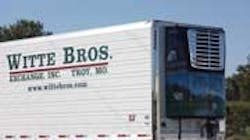Witte Brothers pursues more anti-idling connections
You don’t have to convince Troy MO-based hauler Witte Brothers of the merits of using electrical connections rather than idling to operate the refrigeration units on its trailers. The firm makes extensive use of anti-idling technologies, starting at its own facilities.
At its home base, “We use 460-volt, three-phase electric plug-ins for our reefer units now,” said Charla Whalen-Mueller, marketing director for Witte Bros, a provider of nationwide temp-controlled truckload service, custom refrigerated LTL distribution programs, and full-service cold storage. Plug-in power means that even when drivers go home on the weekends, there’s no idling of trucks or trailers to keep perishable loads cool while parked at the company’s yard.
On the road at truckstops, though, it’s a different story. Witte Bros uses APUs (auxiliary power units) and Temp-A-Start units to reduce idling for in-cab comforts and conveniences. The APUs run off their own engines, while Temp-A-Start uses controlled idling, running the engine to get the cab temperature to a specific level before shutting it off. But engine idling is still necessary to keep refrigerated loads in trailers cool.
Witte Bros is interested in using truckstop connections to the local electrical grid to run cab appliances and conveniences as well as trailer refrigeration to cut idling even more. But it hasn’t been able to do so because the connections haven’t been available.
That’s beginning to change, though, as a number of truckstops are gearing up to provide power, which will eliminate the need for both tractor and trailer idling.
The coming of truckstop electrification is one reason the company recently purchased 15 electric-power-connection-ready Carrier Vector 6500 TRUs (transport refrigeration units) for installation on its trailers. These are in addition to its growing fleet of TRUs configured for truckstop connections (often referred to as shorepower) that Witte Bros has purchased, and Whalen-Mueller said the company plans to buy more.
Witte Bros participated in a federally funded program that seeks to encourage haulers to buy equipment set up for truckstop electrical connections, and to make those connections more available out on the road.
The Shorepower Truck Electrification Project (STEP) has two major components. The equipment purchase rebate program, administered by Cascade Sierra Solutions, offers incentives up to 20% of the installed price—or a maximum amount by category—for equipment that can hook up to the power grid or operate on battery power to eliminate engine idling. That includes APUs for heating or cooling the cab and sleeper and running appliances such as microwaves and TVs, and TRUs with electric-standby options. Fleets are eligible for up to 25 rebates each.
The other part of STEP is the installation of electrical connections at 50 truckstops, for a total of 1,200 parking spaces, along major freight corridors. Many of those will come on line in 2012. Shorepower Technologies, which is carrying out the installation program, hopes to eventually outfit 500 to 1,500 truckstops with electrical connections.
Many of those sites will also have higher-voltage connections for TRUs to keep refrigerated loads cool without engine idling.
“Haulers are adding anti-idling equipment to their fleets, but they also need places to plug in out on the road to take full advantage of their investments,” says Alan Bates, vice president of marketing with Shorepower Technologies. “We’re working to make the vision of available and affordable connection sites a reality, and we’ll make a lot of progress on that this year.”
Witte Bros is also working with Cascade Sierra Solutions to identify benefits of more access to electric plug-in sites, and to determine where the technology should be deployed.
Brent Witte, president of the company, said his company is studying battery-powered APUs (that use truckstop connections to grid power to recharge batteries); the increased availability of truckstop electrification “would definitely enhance our decision to choose them.”
Investing in anti-idling technology is in keeping with the operating philosophy at Witte Bros, Whalen-Mueller said. “Witte has been a dedicated SmartWay partner for several years. TRUs that can be connected to local power are one of many ways Witte has invested in reducing our carbon footprint. We understand the importance of being good stewards to the environment.”
